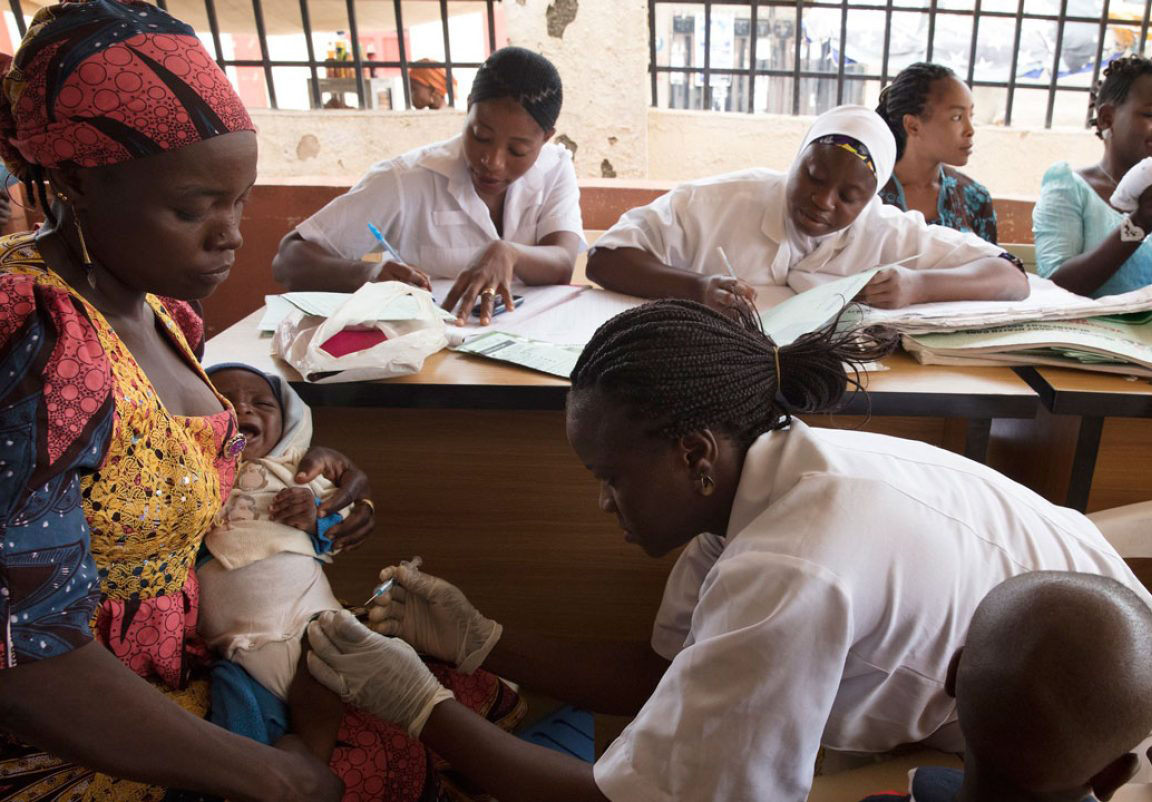
In the spirit of Nigeria’s 64th Independence Anniversary, stakeholders and experts in the health sector have urged the Federal Government to come up with good policies that will uplift and develop the country’s healthcare system.
To the experts, this would encourage access to quality healthcare for all irrespective of tribe and religion and also enable universal healthcare coverage in the country.
Psychedelic social worker at the Federal Neuro Psychedelic Hospital Yaba, Lagos, Ajetunmobi Temitayo, said Nigeria has made progress in vaccine manufacturing, driven by government initiatives and partnerships with organisations like the African Pharmaceutical Technology Foundation (APTF) and the National Institute for Pharmaceutical Research and Development (NIPRD).
She explained that the government has established a national plan for research, development and local production of vaccines, disclosing that companies are interested in starting vaccine production within the next 24 to 36 months.
She explained that despite the progress, Nigeria still relies heavily on vaccine imports as 75 per cent of its needs are imported.
“To address this, Nigeria needs to enhance local capacity through research and development, improve regulatory frameworks and increase funding. With continued government support and private sector involvement, Nigeria can reduce import dependence, strengthen its healthcare sector, and achieve vaccine self-sufficiency, ultimately improving public health outcomes,” she said.
Temitayo explained that Nigeria’s healthcare sector has made significant progress over the past 64 years, with notable improvements in life expectancy, infant mortality rates and vaccination coverage.
“Life expectancy has increased from 53.3 years in 1960 to 64.5 years in 2022, while infant mortality rates have decreased from 138 deaths per 1,000 live births to 74.2 deaths per 1,000 live births during the same period,” she added.
She said the country has also expanded its healthcare infrastructure, including hospitals, clinics, and primary healthcare centres, and developed national health policies and strategies such as the National Health Policy of 2016.
She noted that despite all these, Nigeria still faces significant challenges, including inadequate funding, brain drain, and inequitable distribution of healthcare resources.
Healthcare allocation remains less than five per cent of the national budget, and the country struggles with limited access to quality healthcare, especially for rural and vulnerable populations.
“However, opportunities for improvement exist, such as expanding the National Health Insurance Scheme (NHIS), leveraging public-private partnerships, and adopting digital health innovations,” she noted.
According to her, to address the challenges, experts recommend increasing healthcare funding, strengthening the healthcare workforce, and enhancing community engagement and participatory healthcare.
Temitayo noted that achieving Universal Health Coverage (UHC) in Nigeria requires a multi-faceted approach that addresses various challenges in the healthcare sector.
She said short-term strategies (2023-2025) should focus on increasing healthcare funding to at least five per cent of the national budget, expanding the NHIS to cover more vulnerable populations, strengthening primary healthcare, improving the healthcare workforce, and enhancing public-private partnerships.
She stated that these initiatives should be aimed at providing financial risk protection and improving access to quality healthcare services.
“Medium-term (2025-2030) and long-term (2030-2040) strategies involve developing comprehensive healthcare infrastructure, implementing digital health solutions, focusing on preventive care, strengthening healthcare governance, and encouraging community participation. Additionally, achieving full NHIS coverage, developing indigenous healthcare solutions, establishing specialised healthcare institutions, fostering international collaborations, and ensuring sustainable healthcare financing are crucial for Nigeria’s progress towards UHC. Key reforms, stakeholder engagement, and monitoring and evaluation are also essential to ensure effective implementation and progress tracking,” she said.
Temitayo said by implementing these strategies, Nigeria can significantly improve its healthcare sector and achieve UHC.
A public health physician, health promotion specialist and Fellow of the U.S. Government Mandela Washington Fellowship for African Leaders, Dr. Obinna Ebirim, while assessing the healthcare policies of the government in the last 64 years, stated that Nigeria has developed several good health policies, such as the National Basic Health Services Scheme (1975) and the Alma Ata Declaration (1978), aimed at improving primary healthcare. He noted that the National Health Law (2014) further solidified the legal framework for healthcare delivery, stressing that these policies reflect the commitment to improving healthcare, especially in primary healthcare (PHC).
Ebirim said political will has been the key determinant of success, noting: “For instance, the ‘Golden Era’ of Primary Health Care (1986-1990), saw significant improvements in immunisation coverage and PHC expansion. However, inconsistent implementation and lack of sustained political commitment have hindered long-term health outcomes. We’ve seen cases where strong political backing, like the expansion of PHC or the launch of the Midwives Service Scheme (2009), led to positive outcomes.”
Ebirim noted that many policies, such as those related to maternal and child health or immunisation, have not been sustained long enough to achieve lasting improvements in health outcomes.
“As a result, despite having well-intentioned policy frameworks, the health of the general populace has not consistently improved. However, while I rate health policy in the last 64 years a three out of five with commendation in the areas like effectiveness, establishment of recommendations, and ethical considerations while we have been lacking in efficiency and evaluation of alternatives,” he added.
He stated that to achieve UHC in Nigeria, the country must focus on fully implementing and enforcing the provisions of the National Health Law (2014).
“This law provides the foundation for ensuring access to quality healthcare for all Nigerians. Expanding health insurance coverage is important, as it will reduce out-of-pocket payments, protect households from catastrophic health expenditures, and provide financial risk protection.
“UHC is about ensuring that all people can access necessary quality health services without suffering financial hardship. It requires a holistic approach that integrates people-centred care, strategic and sustainable financing, and a robust capacity to respond to health system challenges.”
He stressed that to achieve this, partnerships between the government, private sector, and development partners are essential.
“The private sector, in particular, can play a significant role in delivering healthcare solutions that are scalable and sustainable.
“Furthermore, achieving UHC depends on addressing health inequities, particularly for underserved, vulnerable, and marginalised populations. We must design and implement health policies that specifically target these groups to ensure that no one is left behind. Reducing health disparities will help create a fairer system, bringing us closer to a future where all Nigerians can enjoy quality healthcare, free from the burden of catastrophic spending or financial hardship,” he added.
A public health policy and management specialist, Dr. Laz Ude Eze, said other ways the Nigerian health sector could progress include providing access to vaccines during outbreaks.
He also called for the provision of funds for research and development of vaccines and diagnostic tools and also for the development of effective emergency response plans that will facilitate movement of infected persons to centres for care/treatment.
“Most importantly, healthcare workers should be well taken care of and impressively remunerated,” Eze added.
He noted that there is also a great need for collaboration among various healthcare workers and professionals, stressing that this will be a more robust and holistic strategy.






